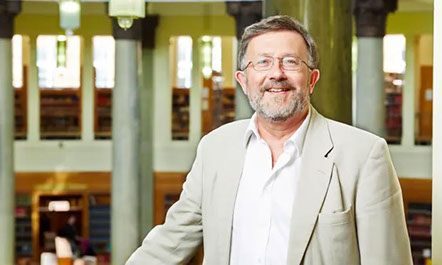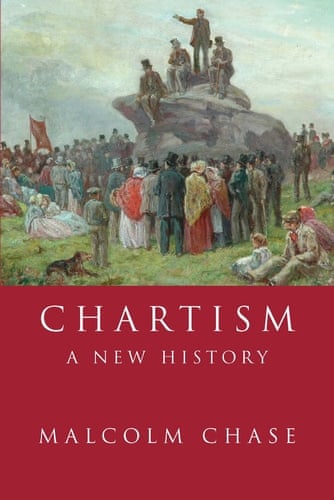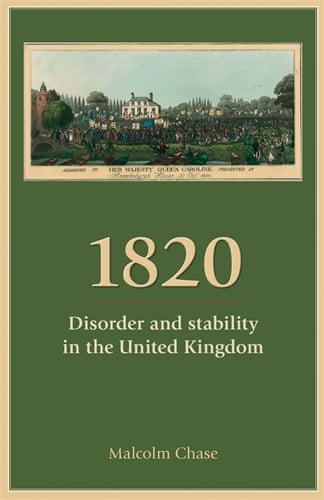
THE LEADING AUTHORITY ON THE CHARTISTS
Malcolm Sherwin Chase, historian.
3 February 1957; died 29 February 2020
Simon Hall (Leeds University) and
Rohan McWilliam (Anglia Ruskin University)
First published: The Guardian 23 March 2020

Prof. Malcolm Chase in the Brotherton library, Leeds University, 2014.
Photograph: University of Leeds
The social historian Malcolm Chase, who has died aged 63 after suffering from a brain tumour, explored the world of working-class people in 19th-century Britain and their radical movements. In this he was following the trail first blazed by EP Thompson in his book The Making of the English Working Class (1963) by rejecting “the enormous condescension of posterity” often to be found in history written by the educated rich.
There was nothing condescending about the way Malcolm wrote about the victims of the Peterloo massacre, calling for political representation in Manchester in 1819, or the Chartists, who championed democracy in the two decades from 1838. Chartism: A New History (2007) established him as the leading authority on a movement of more than 3 million people at its height, the first such driven by the working classes, whose people’s charter called for extension of the vote and annual elections.
Woven into the account were biographies of both male and female activists, forgotten until uncovered by his painstaking research

Chartism: A New History, 2007, by Malcolm Chase
Hearing Malcolm lecture on the Chartists was always a thrilling experience: he recognised that radicals expressed themselves through fiction and poetry, and sometimes burst into song. He was open to literary scholarship rethinking the aesthetic and imaginative aspects of 19th-century radicalism and acknowledged the importance of locality, examining events in Scotland, Wales and Ireland as well as England.
When he started writing, historians tended to be more interested in the industrial revolution as a background to the rise of the labour movement. However, Malcolm argued that, far from being a backward-looking anachronism, radical agrarianism was central to working-class experience and the development of new kinds of oppositional politics.
In The People’s Farm (1988), he examined the relationship between “land consciousness” and early socialism, offering a new evaluation of Thomas Spence, the English radical who supported the common ownership of land. It was followed by Early Trade Unionism: Fraternity, Skill and the Politics of Labour (2000), which traced the principle of workers organising themselves from the 17th century onwards.
His book 1820 (2015) examined the fallout from Peterloo, including the Cato Street conspiracy, to assassinate the prime minister, Lord Liverpool, and his cabinet, and the outpouring of popular support for Caroline of Brunswick, the estranged wife of the new king, George IV.
Among his numerous further studies of Chartism was a collection of essays, The Chartists: Perspectives and Legacies (2015).
Born in Grays, Essex, Malcolm was the son of Sherwin Chase, a carpenter and later a building surveyor, and his wife, Elizabeth (nee Austin), a bank clerk. As a child he accompanied his father on trips to London searching for original maritime artefacts and uniforms.

1820: Disorder and Stability in the United Kingdom, 2015, by Malcolm Chase
From Palmer’s boys school in the town he went on to York University, where he gained a history degree (1978), and Sussex University for a master’s in modern social history (1979) and a DPhil (1984) supervised by the labour historian JFC Harrison, who shaped his non-doctrinaire approach to uncovering the lives of the common people. At Sussex he met Shirley Fereday and they married in 1983.
At Leeds University he worked in adult education from 1982 onwards, the department having nurtured labour history as a discipline in the 1950s. His interest in this field was heightened by teaching in centres around Leeds and Middlesbrough, and he became head of the eventual school of continuing education. In 2005 he joined the history department and four years later was appointed professor.
A collaboration with the all-party parliamentary group on history and archives led to an exhibition and a lecture on the Chartists (2013) in the Speaker’s rooms at Westminster. He also appeared on the ITV series Britain’s Secret Houses (2013) and Radio 4’s British Socialism: The Grand Tour (2018).
For the BBC1 programme Who Do You Think You Are? Malcolm met Jeremy Irons in a London pub to tell of how the actor’s great-great-grandfather, a Chartist, had served 18 months in Newgate prison for his involvement in planning an armed conspiracy, the authorities having been tipped off by an informer.
Inspired by the participatory ethos of the History Workshop Movement of the 70s, Malcolm kept in touch with – and continued to learn from – local historians, amateur enthusiasts and the interested general public. He spoke at countless meetings of local history societies, historical association branches, schools and colleges, and regional museums and galleries, regularly penning thoughtful pieces for local and regional history journals. He was generous with his time, encouraging younger historians and providing opportunities for them.
At the annual Chartism Day conferences in different centres he was the animating figure encouraging new research and discussion. He served as president of the Society for the Study of Labour History (2005-07) and then chair of the Social History Society (2011-14), and had recently embarked on a project about the Regency radical Sir Francis Burdett.
Malcolm Chased is survived by Shirley, their daughter, Sarah, and granddaughter, Sophie.
https://www.theguardian.com/books/2020/mar/23/malcolm-chase-obituary









